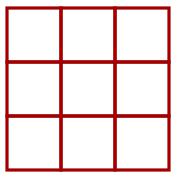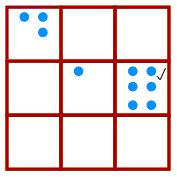Copyright © University of Cambridge. All rights reserved.
'Dotty Six for Two' printed from https://nrich.maths.org/
Show menu
Here's a game to play with an adult!
 How do you play?
How do you play?
You'll need an adult to play with.
You'll also need a 1 to 6 dice (you could use our interactive dice), and a grid like the one below. You can print some off here.

Watch the video below which shows two people playing the game.
Can you work out how to play the game?
What do you think the rules might be?
How might someone win the game?
When you've talked about your ideas, carry on reading to check how to play:
Take turns with the adult to throw the dice and draw that number of dots in one of the boxes on the grid. Put all of your dots in one of the boxes. You can't split them up and you can't have more than six dots in a box. When a box is full, you could put a tick in the corner like this:

Keep going until there are three ticks in a row or column or diagonal. The winner is the person who puts the last tick.
How do you decide where to put your dots each turn?
Now, can you change the game to make your own version?
There is a poster of the game here.
The game as introduced is intended for KS1 children who are just beginning to become confident with small numbers. However there are many variations, some suggested below, that make it suitable for older children. Consolidation of basic number facts is combined with an element of strategic thinking.
Easier version: small children could use counters on a large grid. They could begin with six counters in each box and take away the number thrown on the dice.
Harder version: try using a different total, different dice, or a bigger grid. You could make the winner the first to complete a whole row that adds to a certain total (e.g. 20), change the shape of the grid (triangles rather than squares perhaps), or use a different sort of number - fractions, decimals, percentages...
There's a classroom version of this game here.